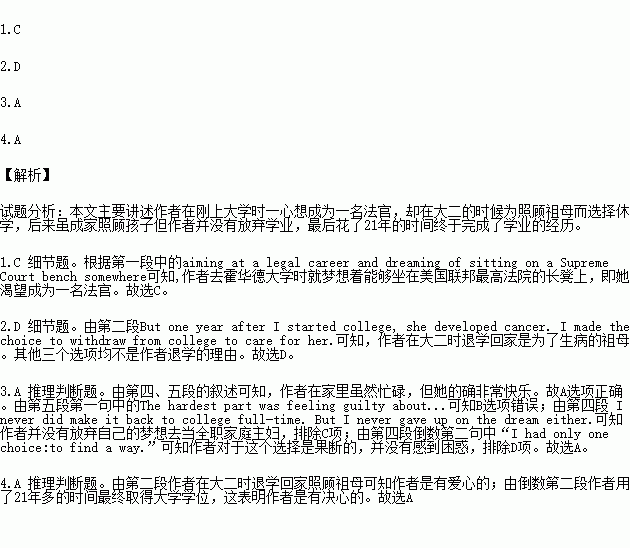题目内容
In the fall of 1985, I was a bright-eyed girl heading off to Howard University to study law, aiming at a legal career and dreaming of sitting on a Supreme Court bench somewhere. Twenty-one years later I am still a bright-eyed dreamer and one with quite a different tale to tell.
My grandma, an amazing woman, graduated from college at the age of 65. She was the first in our family to reach that goal. But one year after I started college, she developed cancer. I made the choice to withdraw from college to care for her. It meant that school and my personal dream would have to wait.
Then I got married with another dream: building my family with a combination of adopt and biological children. In 1999, we adopted our first son. To lay eyes on him was fantastic and very emotional. A year later came our second adopted boy. Then followed son No.3. In 2003, I gave birth to another boy.
You can imagine how busy I became, raising four boys under the age of 8. Our home was a complete zoo--a joyous zoo. Not surprisingly, I never did make it back to college full-time. But I never gave up on the dream either. I had only one choice: to find a way. That meant taking as few as one class each semester.
The hardest part was feeling guilty about the time I spent away from the boys. They often wanted me to stay home with them. There certainly were times I wanted to quit, but I knew I should set an example for them to follow through the rest of their lives.
In 2007, I graduated from the University of North Carolina. It took me over 21 years to get my college degree!
I am not special, just single-minded. It always struck me that when you're looking at a big challenge from the outside it looks huge, but when you're in the midst of it, it just seems normal. Everything you want won't arrive in your life on one day. It's a process. Remember: little steps add up to big dreams.
1.When the author went to Howard University, her dream was to be______.
A. a writer B. a teacher C. a judge D. a doctor
2.Why did the author quit school in her second year of college?
A. She wanted to study by herself.
B. She fell in love and got married.
C. She suffered from a serious illness.
D. She decided to look after her grandma.
3.What can we learn about the author from Paragraphs 4 and 5?
A. She was busy but happy with her family life.
B. She ignored her guilty feeling for her sons.
C. She wanted to remain a full-time housewife.
D. She was too confused to make a correct choice.
4.Which of the following can best describe the author?
A. Caring and determined. B. Honest and responsible.
C. Brave and sensitive. D. Independent and single-minded.

